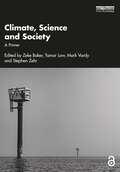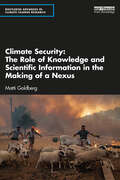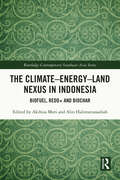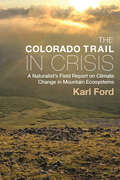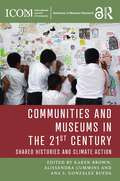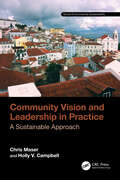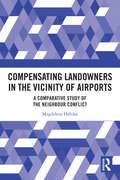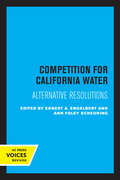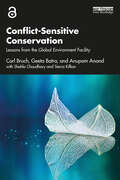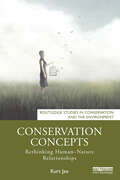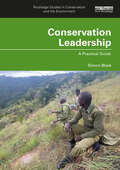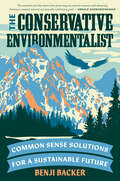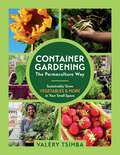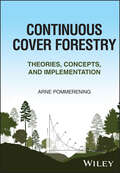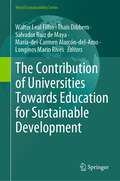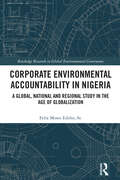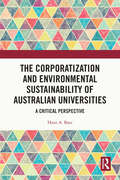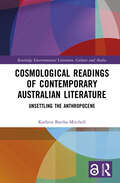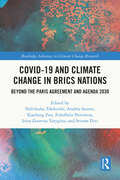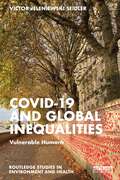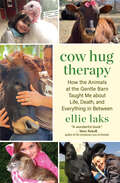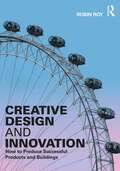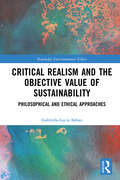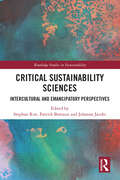- Table View
- List View
Climate, Science and Society: A Primer
by Zeke Baker Tamar Law Mark Vardy Stephen ZehrClimate, Science and Society: A Primer makes cutting-edge research on climate change accessible to student readers. The primer consists of 37 short chapters organized within 11 parts written by Science and Technology Studies (STS) and other social science scholars. It covers a range of key topics including communication, justice and inequality, climate policy, and energy transitions, situating each one within the context of STS studies. Each reading translates a focused area of climate change research into short, accessible, and lively prose. Chapter authors open debates where relevant, consider policy implications, critique existing areas of research, and otherwise situate their reading within a larger body of research relevant to climate change courses. Designed as a jumping-off point for further exploration, this innovative book will be essential reading for students studying climate change, STS, environmental sociology, and environmental sciences. The Open Access version of this book, available at www.taylorfrancis.com, has been made available under a Creative Commons Attribution-Non Commercial-No Derivatives 4.0 license.
Climate Security: The Role of Knowledge and Scientific Information in the Making of a Nexus (Routledge Advances in Climate Change Research)
by Matti GoldbergThis book presents an empirical study of the role of knowledge in the making of the climate-security nexus. Climate change might give the Soviet Union a competitive advantage in the Cold War. Extreme droughts contributed to wars in Darfur, Syria or Yemen. Melting sea ice creates geopolitical risks. Russia’s climate-destroying hydrocarbons enabled its invasion of Ukraine. These are just some of the many ways in which climate change and conflicts have been linked into a climate-security nexus. In this innovative book, Matti Goldberg considers how such connections are constructed and asks to what extent they are driven by evidence and science. Goldberg describes the tools used to present the wars of Darfur and Syria as “climate wars” and considers the fragmented role of the sciences in those presentations as well as the resulting patterns of influence and marginalization of impacted populations. The author also highlights how the international community can better integrate the situations of people at the frontlines of climate change into policymaking and, based on an analysis of the dynamic nature of power, identifies potential entry points for positive change. This book is a must-read for researchers interested in climate-security links, in science-policy interfaces, and in the formation of nexuses of issues in international politics. It is also of interest to practitioners working on the climate-security nexus and science-policy interfaces.
The Climate–Energy–Land Nexus in Indonesia: Biofuel, REDD+ and biochar (Routledge Contemporary Southeast Asia Series)
by Akihisa Mori Alin HalimatussadiahThis book extends the framework of the climate-energy-land nexus to elucidate political, economic, social, and institutional factors and causal mechanisms that stringent climate targets bring about, rather than mitigate a disproportional heavy burden on the forest sector in Indonesia. Assessing climate, energy, agricultural, forest, and transmigration policies, and REDD+ and biochar solutions through a multidisciplinary approach, ranging from biological, agricultural, technological, economic, and institutional lenses, the book identifies the political-economic and socio-technical regimes that cause the crosssectoral transfer of responsibility for greenhouse gas emissions to palm-oil-based biofuel, imposing an excess burden on the forest sector and accelerating indirect land-use change. It also proposes possible countermeasures for agricultural and forest sectors, reconfirming that technical applications and integrated policymaking should trigger the socioeconomic changes that will make transformative change happen in Indonesia. As an analysis of the success, or otherwise, of stringent climate targets, policies, and technological and non-technological measures on the reduction of greenhouse gases, this book will be of great interest to students and scholars in the fields of environment & sustainability, Asian studies, energy, environment and agriculture, forestry, and agriculture & environmental sciences. It will also appeal to practitioners and policymakers tackling net-zero emissions and land and forest governance.
Climbing the Volcano: A Journey in Haiku
by Curtis ManleyThrough haiku, a young boy narrates his family&’s invigorating hike to the peak of Oregon&’s South Sister volcano.For centuries, haiku has offered meditation on the grace and majesty of nature. In Climbing the Volcano, old meets new as a young protagonist uses the poetic form to voice his wonder. Trekking uphill, the family encounters tiny toads, colorful butterflies, soaring birds of prey, and so much more to see, do, and feel. dormant volcano—but at sunrise each dayit blazesClimbing the Volcano is a call to adventure in the natural world, and a wonderful introduction to poetic forms. Young readers will be inspired to summit their own peaks and to find their own voices to share what they discover there. Whether you live in the shadow of a volcano, amid sprawling flatlands, or anywhere in between, Climbing the Volcano invites you to get out there and explore. Jennifer K. Mann&’s breezy, childlike artwork harmonizes with Curtis Manley&’s poetry to detail this mesmerizing Pacific Northwest journey.A Junior Library Guild Gold Standard Selection
The Colorado Trail in Crisis: A Naturalist’s Field Report on Climate Change in Mountain Ecosystems
by Karl FordThe Colorado Trail in Crisis addresses the sweeping transformation of western forests and wilderness ecosystems affected by climate change. This book is equal parts trail journal and synthesis of natural and human history. Karl Ford uses research on climate impacts to forests, wildlife, hydrology, and more to stress the urgent need for an action plan to reduce greenhouse gases and save forests and watersheds. Using his hike along the popular five-hundred-mile Colorado Trail to present his personal observations about more than a hundred miles of dead and dying forest, Karl Ford presents a brief environmental history of these areas of the state, weaving in scientific studies about forest mortality caused by insect infestations, wildfire, drought, and loss of snowpack, and describes the poor current prospects for reforestation as the climate continues to warm. His own Lakota ancestry, as well as historical references to local Tabeguache Ute Chief Ouray and displaced Ute populations, meaningfully frames important conversations about caretaking and connection to place. Ford also proposes potential solutions to drought and forest mortality problems, as well as varying approaches and limitations to mitigation efforts. The Colorado Trail in Crisis appeals to hikers and nature lovers seeking to learn about the natural history, beauty, and serenity of the Colorado Trail, as well as students, conservationists, and scientists researching climate change effects on Colorado mountain ecosystems.
Communities and Museums in the 21st Century: Shared Histories and Climate Action (ICOM Advances in Museum Research)
by Karen BrownCommunities and Museums in the 21st Century brings together innovative, multidisciplinary perspectives on contemporary museology and participatory museum practice that contribute to wider debates on museum communities, heritage, and sustainability. Set within the context of globalisation and decolonisation, this book draws upon bi-regional research that will enrich our understanding of the complex relationships between Europe, Latin America and the Caribbean through museum studies and practice. Chapters reflect upon the role of museums in defining community identities; the importance of young people’s participation and intergenerational work for sustainability; the role of museums in local development; and community-based museums and climate change. Contributors examine these issues through the lens of museum partnerships and practices, as well as testing the continued relevance of the notion of ‘integral museum’ and its relatives in the form of ecomuseums. With its focus on regional museums in Latin America and Caribbean, this book highlights how the case studies promote greater intercultural dialogue, global understanding and social cohesion. It also demonstrates how the methodology can be adapted to other communities who are facing the perils of climate change and unsustainable forms of development. Communities and Museums in the 21st Century proposes creative and sustainable strategies relevant to a globalised future. With its focus on global societal challenges, this book will appeal to museologists and museum practitioners, as well as those working in heritage studies, cultural studies, memory studies, art history, gender studies, and sustainable development.
Community Vision and Leadership in Practice: A Sustainable Approach (Social-Environmental Sustainability)
by Chris Maser Holly V. CampbellThis book is about building and maintaining involved, sustainable, and inclusive communities from the ground up during a period of unprecedented growth and global change. It explains the concepts and principles of community and sustainability and provides students with a framework of sustainable community planning to put into practice. It is also designed to help communities everywhere identify and reconnect the true essence of their ecological setting with the objective of raising their quality of life by increasing social, environmental, and economic sustainability. Features: Provides up-to-date frameworks for sustainable community planning processes and case studies on community planning Explains tools for sustainable planning in accessible (non-specialist) language Illustrates a roadmap to an inclusive, collaborative future Explains aspects of sustainable community planning to maximize ecological ecosystem services and climate co-benefits simultaneously Includes discussion questions and suggestions following each chapter Intended for undergraduate and graduate students taking leadership and community courses with an emphasis on sustainable practices and ethics, as well as for citizens and professionals involved in community projects related to sustainability, the authors provide a forward-thinking approach, showing readers that they are capable of making a positive impact on the future of community development through sustainable approaches and ethical leadership practices.
Compensating Landowners in the Vicinity of Airports: A Comparative Study of the Neighbour Conflict
by Magdalena HabdasThe purpose of this book is to consider the neighbour conflict arising between airports and neighbouring owners of land, particularly with residential uses, as well as to assess the existing solutions applied to manage or resolve that conflict. The book explains why the neighbour conflict between the airport and landowners is of a particular kind and what legal instruments are applied to resolve it in an attempt to balance the interests of opposing parties. Readers will develop an understanding of how the law operates when damage is caused by a legal act of the government and what the limits of compensable loss are. In addition, the reader will discover the economic foundations of possible solutions and why not all market losses are legally compensable. Key features of this book include: • a consideration of key legal concepts such as neighbour law, nuisance, protection of property, land use restrictions, liability, and compensation to inform a unique analysis of neighbour law in the context of conflict between airports and neighbouring landowners • practical guidance on an airport’s legal liability towards neighbouring landowners • a comparative analysis of airport’s liability, compensation claims, their scope and economic effects • a comparative overview of planning and environmental solutions applied in a variety of jurisdictions • discussion of valuation methods and challenges when loss of property value is the measure of compensation The author’s intention is to promote conscious and civil relations among market participants, as opposed to opportunistic and speculative behaviour. This book is important reading for lawyers, academics, PhD students, and postgraduate students dealing with land use regulations, environmental law, compulsory purchase, eminent domain and expropriation issues and compensation for property restrictions, as well as with aviation law and legal aspects of airport operations.
Competition for California Water: Alternative Resolutions
by Ernest A. Engelbert Ann Foley ScheuringCalifornia’s water is at the center of an intense economic and political struggle. A balance between supply and demand must be reached, but it is far from certain that all Californians will get as much water as they want at a price they feel is right. Competition for California Water presents essential information on key issues, including: Costs: What would be the yields and what would be the costs, in dollars as well as less tangible values, of developing new sources of water? Cost-sharing: How much of the cost of water development and distribution should be borne by the general public, and how much by water users and other beneficiaries? Environmental protection: To what extent should environmental values be protected? Conservation: To what extent can the need for new water development be offset by conservation and more efficient use of water? Institutional reform: Can changes in the laws and institutions of California produce a more efficient system of water supply and management? Agriculture: How much increase in cost and/or loss of water can California agriculture bear and still remain competitive? Thirty-one experts on all aspects of this topic project alternative futures for California’s water supply. Written in nontechnical language, Competition for California Water is an invaluable source of information for Californians concerned with the future of their state.This title is part of UC Press's Voices Revived program, which commemorates University of California Press’s mission to seek out and cultivate the brightest minds and give them voice, reach, and impact. Drawing on a backlist dating to 1893, Voices Revived makes high-quality, peer-reviewed scholarship accessible once again using print-on-demand technology. This title was originally published in 1982.
Conflict-Sensitive Conservation: Lessons from the Global Environment Facility
by Carl Bruch Geeta Batra Anupam Anand Shehla Chowdhury Sierra KillianThis book provides an empirically formulated foundation for conflict-sensitive conservation, a field in which the existing literature relies primarily on anecdotal evidence. Seeking to better understand the impact of conflict on the implementation and outcomes of environmental projects, the Global Environment Facility (GEF) Independent Evaluation Office and the Environmental Law Institute undertook an evaluation of GEF support to fragile and conflict-affected contexts. Following a qualitative and quantitative analysis of documents from more than 4,000 projects, the research team discovered a statistically significant negative correlation between a country’s Fragile States Index score and the implementation quality of environmental projects in that country. In this book, the evaluation and research team explain these groundbreaking findings in detail, highlighting seven key case studies: Afghanistan, Albertine Rift, Balkans, Cambodia, Colombia, Lebanon, and Mali. Drawing upon additional research and interviews with GEF project implementation staff, the volume illustrates the pathways through which conflict and fragility frequently impact environmental projects. It also examines how practitioners and sponsoring institutions can plan and implement their projects to avoid or mitigate these issues and find opportunities to promote peacebuilding through their environmental interventions. Examining data from 164 countries and territories, this innovative book will be of great interest to students and scholars of environmental management, conservation, international development, and the fast-growing field of environmental peacebuilding. It will also be a great resource for practitioners working in these important fields.
Conservation Concepts: Rethinking Human–Nature Relationships (Routledge Studies in Conservation and the Environment)
by Kurt JaxThis book provides a review of the multitude of conservation concepts, both from a scientific, philosophical, and social science perspective, asking how we want to shape our relationships with nature as humans, and providing guidance on which conservation approaches can help us to do this. Nature conservation is a contested terrain and there is not only one idea about what constitutes conservation but many different ones, which sometimes are conflicting. Employing a conceptual and historical analysis, this book sorts and interprets the differing conservation concepts, with a special emphasis on narrative analysis as a means for describing human–nature relationships and for linking conservation science to practice and to society at large. Case studies illustrate the philosophical issues and help to analyse major controversies in conservation biology. While the main focus is on Western ideas of conservation, the book also touches upon non-Western, including indigenous, concepts. The approach taken in this book emphasises the often implicit strategic and societal dimensions of conservation concepts, including power relations. In finding a path through the multitude of concepts, the book showcases that it is necessary to maintain the plurality of approaches, in order to successfully address different situations and societal choices. Overall, this book highlights the very tension which conservation biology must withstand between science and society: between what is possible and what we want individually or as a society or even more what is desirable. Bringing some order into this multitude will support more efficient conservation and conservation biology. This book will be of great interest to students and scholars studying nature conservation from a variety of disciplines, including biology, ecology, anthropology, sociology, geography, and philosophy. It will also be of use to professionals wanting to gain an understanding of the broad spectrum of conservation concepts and approaches and when to apply them.
Conservation Leadership: A Practical Guide (Routledge Studies in Conservation and the Environment)
by Simon BlackThis book is an important guide for individuals seeking to develop and grow their leadership skills in the wildlife conservation sector, across varied disciplines such as environmental management, conservation biology, and ecotourism.Conservation Leadership addresses what leadership is, why it is important, and how to be an effective leader. It identifies the common pitfalls or mistakes in a leader’s thinking or behaviour, and the unexpected consequences or responses which can arise, and then explores more helpful alternative approaches to leadership. The book is divided into three parts: Part I: Leadership principles Part II: Four areas of profound theory: knowledge, psychology, systems, and variation Part III: Skills and competencies for conservation leaders It focuses on contextual and organisational challenges in conservation, including limited resources, remote locations, fragile species of concern, politics, community conflict, crime, and commercial pressures. The scope is global, using diverse examples such as sea turtle head-starting in South Asia, reforestation in North Africa, bird conservation in North America, human–wildlife interactions in the Himalayas, and post-colonial issues in the Caribbean. Case studies illustrate key learning points from small local teams through to global transnational initiatives. Exercises in each chapter enable the exploration of less-familiar topics, including interpersonal skills, goal setting and performance measurement, plus a unique research-derived conservation leadership self-assessment tool.This book is an essential reading resource for professionals and senior leaders in the wildlife management and conservation sector, as well as students on biodiversity conservation, wildlife conservation, and environmental management courses.
The Conservative Environmentalist: Common Sense Solutions for a Sustainable Future
by Benji BackerA young, conservative environmentalist provides an intrepid vision for both solving our climate crisis and prioritizing the American national interest.Politicians, pseudo-experts, and other partisans have led us to believe that there are only two approaches to climate change: doomerism or denial. Benji Backer, Founder and Executive Chairman of the American Conservation Coalition, argues that both are dead ends. In The Conservative Environmentalist, he delivers an entirely new strategy to take care of the planet while putting put the economic interest of the American people first. Backer makes the compelling case that conservative principles are the key to climate solutions that actually work. In this book, you&’ll visit the country&’s most diverse ecosystems and consequential manufacturing hubs—from Utah coal mines and Texas oil fields to Louisiana wetlands and Rhode Island offshore wind farms—witnessing the power of individual entrepreneurship and local problem-solving. You&’ll be inspired by groundbreaking efforts to strengthen earth&’s ecosystems (that Green New Dealers and other Big Government advocates would prefer to keep hidden), like partnerships between oil and gas companies and environmental nonprofits to preserve thousands of acres of wetlands. Drawing on cutting-edge science, a deep understanding of local community needs, and his experience rallying politicians on both sides of the aisle to take action, Backer offers hope for everyone who cares about the state of the great outdoors. Fascinating, clear-headed, and full of surprises, The Conservative Environmentalist is the fresh, audacious approach needed to ensure a sustainable future, and particularly one that works for America.
Container Gardening - The Permaculture Way: The Permaculture Way: Sustainably Grow Vegetables & More In Your Small Space
by Valéry TsimbaAnyone, anywhere can grow fresh, healthy produce, foster biodiversity, and reconnect with nature by using the permaculture approach—no matter your space or experience. Permaculture—rooted in centuries-old techniques for growing food with care for the Earth—is the key to producing a bigger harvest than you ever thought possible on your balcony, patio, driveway, deck, and anywhere in between! With sustainability as her guiding principle, Valéry Tsimba enthusiastically instructs home gardeners of all skill levels and backgrounds in her proven container gardening methods, from start to finish. Use the principles of permaculture to increase your garden’s productivity, biodiversity, and beauty by starting small and going slow. Get set up: Pick the best planters and tools for your space and learn how to adapt to natural conditions like wind and sun exposure. Increase your harvest naturally with companion planting, small-space composting, chemical-free fertilizers, and staggered harvests. Learn which plants are best suited to container gardens, from leafy greens and pollinator-friendly flowers to strawberries and even melons! Containers make gardening more accessible for everyone. Whether you live in an apartment, have a disability or chronic illness, have never gardened before, or are an experienced gardener new to permaculture, Container Gardening—The Permaculture Way brings sustainable gardening within reach.
Continuous Cover Forestry: Theories, Concepts, and Implementation
by Arne PommereningCONTINUOUS COVER FORESTRY Gain expertise in the development of healthier, more sustainable forests with this indispensable guide Continuous Cover Forestry (CCF) is an approach to forest management with over a century of history, one which applies ecological principles to the project of developing biologically diverse, structurally complex forests. Long used as the standard forest management method in Central Europe, CCF is generating renewed interest globally for its potential to develop and sustain forests that can withstand climate change impacts, maintain forest biodiversity in the face of major ecological challenges and offer better recreation experience. There is an increasingly urgent need for forest scientists and policymakers to be familiar with the toolkit provided by CCF. Continuous Cover Forestry: Theories, Concepts, and Implementation provides a thorough, up-to-date introduction to the theory and practice of CCF. Beginning with an overview of the method’s history and its foundational principles, the book provides detailed guidance for applying CCF methods to a range of ecological scenarios and forest types. The result is a clear, comprehensive portrait of this increasingly effective set of forestry tools. Continuous Cover Forestry readers will also find: Case studies throughout showing CCF at work in real-world forests Detailed discussion of topics such as forest structure, transformation, silvicultural systems, training, carbon forestry, conservation and more R code ready to take and apply Simple, adaptable models for deriving quantitative guidelines for CCF woodlands Continuous Cover Forestry is ideal for students, scholars and practitioners of forest science, forest ecology, conservation, and environmental management, as well as policymakers dealing with forestry or climate policy.
The Contribution of Universities Towards Education for Sustainable Development (World Sustainability Series)
by Walter Leal Filho Thais Dibbern Salvador Ruiz de Maya María-del-Carmen Alarcón-del-Amo Longinos Marin RivesThe book gathers inputs from universities and research organizations working on matters related to sustainable development in a variety of contexts. It also provides a platform for the dissemination of information on the latest initiatives, paving the way for technology transfer and networking. Furthermore, the book intends to provide a fertile basis upon which universities may cooperate more closely in this key area. Universities, as centers of education, research, and innovation, have a unique position and responsibility in promoting sustainability. They can offer degree programs, courses, and workshops focused on sustainability, environmental studies, and related fields, educating students and the wider community about the principles and challenges of sustainability. Also, universities can conduct cutting-edge research to address sustainability challenges, such as climate change, resource depletion, and biodiversity loss. They can develop innovative technologies and solutions that promote sustainable practices in various sectors, including energy, agriculture, transportation, and urban planning. There is a perceived need to better understand and engage universities further on sustainability initiatives. Against this backdrop and in order to facilitate a broad discussion on the contribution of universities toward sustainability, this book is being produced.Last but not least, a further aim of the book is to present methodological approaches and experiences deriving from case studies and projects, which aim to show how sustainability may be incorporated as part of university programs.
Corporate Environmental Accountability in Nigeria: A Global, National and Regional Study in the Age of Globalization (Routledge Research in Global Environmental Governance)
by Felix Moses EdohoThis book examines the imperative role of global environmental governance, and the need to incorporate corporate environmental accountability and mechanisms for enforcement, to effectively address the global environmental crisis.The author, Felix Moses Edoho, Sr., examines the issues at the various global, national, and regional levels. In Part I the book examines the issues at the global level and looks at the impact of transnational corporations (TNCs) and globalization on the global environmental crisis. Furthermore, it also examines the efforts of the United Nations in initiating global environmental architecture to tackle the crisis. Part II considers the issues at the national level and focuses on Nigeria. The author explores Nigeria’s regulatory and institutional framework for environmental governance and implementation. Lastly, at the regional level in Part III, the discourse centers on how decades of oil exploration and production have unleashed monumental ecological tragedies in the Niger Delta region of Nigeria due to the lack of corporate environmental accountability.This book will be of great interest to academics and students who are interested in broadening their knowledge of environmental governance and policy in developing countries. It will also be of value to environmental regulatory agencies and public administrators, development professionals, and TNCs.
The Corporatization and Environmental Sustainability of Australian Universities: A Critical Perspective
by Hans BaerAnalysing the juxtaposition of two trends in universities – corporatisation and environmental sustainability – this book explores how they are more contradictory than compatible. Hans A Baer argues that this contradiction is unavoidable because of the capitalist parameters in which they operate, including a commitment to on-going economic growth which contributes to social inequality, environmental degradation, and greenhouse gas emissions. Drawing on archival sources and Baer’s experiences in university sustainability forums, the book exposes how what universities claim to do in relation to environmental sustainability compares with their research, educational, operational and institutional activities. Presenting a critique of and a radical alternative to the status quo, this book is suitable for academics and students of anthropology, environmental studies and higher education.
Cosmological Readings of Contemporary Australian Literature: Unsettling the Anthropocene (Routledge Environmental Literature, Culture and Media)
by Kathrin Bartha-MitchellThis book presents an innovative and imaginative reading of contemporary Australian literature in the context of unprecedented ecological crisis. The Australian continent has seen significant, rapid changes to its cultures and land-use from the impact of British colonial rule, yet there is a rich history of Indigenous land-ethics and cosmological thought. By using the age-old idea of ‘cosmos’—the order of the world—to foreground ideas of a good order and chaos, reciprocity and more-than-human agency, this book interrogates the Anthropocene in Australia, focusing on notions of colonisation, farming, mining, bioethics, technology, environmental justice and sovereignty. It offers ‘cosmological readings’ of a diverse range of authors—Indigenous and non-Indigenous—as a challenge to the Anthropocene’s decline-narrative. As a result, it reactivates ‘cosmos’ as an ethical vision and a transculturally important counter-concept to the Anthropocene. Kathrin Bartha-Mitchell argues that the arts can help us envision radical cosmologies of being in and with the planet, and to address the very real social and environmental problems of our era. This book will be of particular interest to scholars and students of Ecocriticism, Environmental Humanities, and postcolonial, transcultural and Indigenous studies, with a primary focus on Australian, New Zealand, Oceanic and Pacific area studies.
COVID-19 and Climate Change in BRICS Nations: Beyond the Paris Agreement and Agenda 2030 (Routledge Advances in Climate Change Research)
by Ndivhuho Tshikovhi Andréa Santos Xiaolong Zou Fulufhelo Netswera Irina Zotovna Yarygina Sriram DiviThis book provides a quantitative and qualitative overview of the overall impact that the COVID-19 pandemic had on Brazil, Russia, India, China, and South Africa’s (BRICS countries) capacity to re-shape global climate governance and explore areas for mutual cooperation. BRICS countries account for nearly 40% of the total world population and are thus intrinsic to the global efforts and results for Agenda 2030, the Sustainable Development Goals, the Paris Agreement and beyond. The outbreak of the COVID-19 pandemic does not at first appear to be directly related to BRICS’ policies to address climate change, but it has influenced the pace and nature of climate action due to the loss of human and financial capital. This book examines this correlation and raises awareness of the COVID-19 pandemic’s impacts and potential solutions on BRICS’ climate strategies. Drawing on case studies from each country, the authors use examples from urban governance, energy transitions strategy, foreign investment and more to illustrate how COVID-19 has negatively or positively impacted climate data and draw wider conclusions about the long-term climate policies that may be implemented. This volume will be of great interest to students and scholars of climate change, environmental politics and governance and global development studies.
Covid-19 and Global Inequalities: Vulnerable Humans (Routledge Studies in Environment and Health)
by Victor Jeleniewski SeidlerThis timely and powerful autoethnography traces the spread of and responses to Covid-19: from the uncertainty surrounding its outbreak, to its devastating and continued aftermath. Following the virus in real time, it explores the fears, risks and responses to the global pandemic, and how it has shaped our everyday lives against the backdrop of social and political upheaval, and the looming climate crisis.Social theorist and moral philosopher, Victor Jeleniewski Seidler, discusses fundamental questions of inequality and injustice regarding race, class and gender brought to the fore by the visibility of varying risk levels, vulnerabilities and protections provided by legislative measures against the virus. This interdisciplinary analysis scrutinises values, ethics, responsibilities and uncertain futures formed by the global health crisis, and evaluates media and communications strategies, government responses and political communications at domestic and international levels. Seidler shares critical insights into the cultural history of pandemics, highlighting lessons to be learned from anticipating, preparing for and enduring moments of crisis. Perceiving how the pandemic and climate emergency are interwoven, the book concludes with an urgent call to rebuild sustainable economic, political and ecological imaginations.This wide-reaching volume will appeal to a broad academic readership in environmental studies, sociology, philosophy, health studies, cultural studies, gender studies, media and communication.
Cow Hug Therapy: How the Animals at the Gentle Barn Taught Me about Life, Death, and Everything in Between
by Ellie LaksThe inspirational story of the compassionate and wise animals of the Gentle Barn and how they became a therapeutic salve for countless guests — and mentors for all of us in how to live and die In Cow Hug Therapy, Ellie Laks recounts the extraordinary journey that started with her first teacher, Buddha — not the religious figure, but a rescued miniature Hereford cow. One evening Buddha wrapped her neck around an exhausted and upset Ellie and transferred a singular form of healing and comfort with an incredible impact. Understanding that this was something to be shared with others, Ellie developed Cow Hug Therapy, a groundbreaking approach to emotional healing that has proved effective for trauma, illness, disabilities, addiction, grief, and stress. This colorful and compelling narrative introduces the healing mavens of the barnyard, each with a unique story of being rescued from trauma and treated with love and respect. In their new role at Ellie’s Gentle Barn sanctuaries, these animals have transformed lives and ignited breakthroughs and newfound purpose for visitors including a young mother who lost her baby, a suicidal teenager, a wounded serviceman, an open-heart-surgery patient, and many more. A testament to empathy and the mission to heal animals, people, and the planet, Cow Hug Therapy serves as a beacon of hope for all seeking healing and connection.
Creative Design and Innovation: How to Produce Successful Products and Buildings
by Robin RoyUsing many real-world examples and cases, this book identifies key factors and processes that have contributed to the creation of successful new products, buildings, and innovations, or resulted in some failures. Such factors include the creativity of individuals and groups, their sources of inspiration, the processes of creative design and innovation, and the characteristics of the products, buildings, and innovations themselves. Much has been written about creativity and innovation, but what helps to foster creativity, enable creative ideas to be translated into practical designs, and ensure those new products or buildings succeed as innovations on the market or in use? This book discusses these elements through the author’s origination and analysis of examples and case studies ranging from the revolutionary innovation of the smartphone, through radical innovations in domestic appliances and sustainable housing, to creative designs of contemporary jewellery. The broad range of examples and cases include product and fashion design, filmmaking and fine art, as well as industrial design, engineering, and architecture, offering lessons for creatives, designers, and innovators from many subject backgrounds. Analysis of the different factors, successes, and failures are presented in text boxes throughout the book to allow readers to easily understand the key lessons from each example or case, with numerous colour visuals, diagrams, and charts for illustration. This book is a must-read for a broad audience interested in creativity, design, and innovation, including practitioners in design, engineering, architecture, and product management, and students and instructors of those subjects.
Critical Realism and the Objective Value of Sustainability: Philosophical and Ethical Approaches (Routledge Environmental Ethics)
by Gabriela-Lucia SabauCritical Realism and the Objective Value of Sustainability contributes to the growing discussion surrounding the concept of sustainability, using a critical realist approach within a transdisciplinary theoretical framework to examine how sustainability objectively occurs in the natural world and in society. The book develops an ethical theory of sustainability as an objective value, rooted not in humans’ subjective preferences but in the holistic web of relationships, interdependencies, and obligations existing among living things on Earth, a web believed to have maintained life on Earth over the last 3.7 billion years. It proposes three pillars of sustainability ethics: contentment for the human existence given to us; justice (beyond distributive justice); and meaningful freedom (within ecological and moral limits). Using abductive reasoning, the book infers that there is an out-of-this-world Sustainer behind the Earth’s sustainability acting as a metaphysical source of all being and value. It argues that sustainability value, accepted as a shared understanding of the common good, must guide individual decisions and socio-economic development efforts as a matter of deliberate choice, as well as be built on the awareness that there are non-negotiable, pre-established conditions for our planet’s sustainability. This book will be of interest to students and scholars across fields of inquiry, including sustainability, sustainable development, environmental philosophy and ethics, philosophy of science, and ecological economics, and to whoever may wonder why seasons exists and why humans have creative minds.
Critical Sustainability Sciences: Intercultural and Emancipatory Perspectives (Routledge Studies in Sustainability)
by Stephan Rist Patrick Bottazzi Johanna JacobiThis book explores Critical Sustainability Sciences, a new field of scientific inquiry into sustainability issues. It builds on a highly novel integration of elements from relational ontologies, critical theory, political ecology, and intercultural philosophy in support of emancipatory perspectives on sustainability and development. The book Critical Sustainability Sciences begins by uncovering the weaknesses of mainstream sustainability science and debates on sustainable development. The new field of Critical Sustainability Sciences has grown out of a deep engagement with relational ontologies, which helps to overcome the dualist ontology underlying mainstream notions of sustainability and development. Dualist ontologies reinforce problematic anthropocentric divisions, for example, between humans and nature, subjects and objects, mind and matter, body and soul, etc. Examples from indigenous peoples in Bolivia, India, and Ghana – as well as integrative movements in Chile, Brazil, and Europe – show that relational conceptions of life, rooted in ecosophy and cosmosophy, can provide an intercultural philosophical foundation for Critical Sustainability Sciences. The book concludes by describing three key topics for exploration in Critical Sustainability Sciences: societal reorganization in view of emancipatory, existential, and cognitive self-determination; living labor and commons; and the development of new comprehensive relational scientific paradigms. This book will be of great interest to students, scholars, and practitioners of emancipatory and intercultural approaches to sustainability and development.
